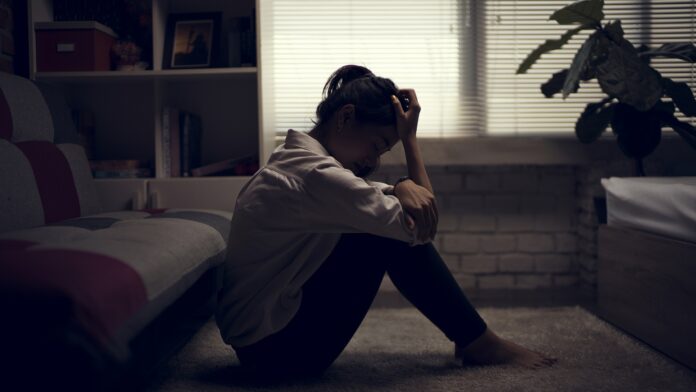Imagine waking up every day with a weight on your chest, a feeling of emptiness that no amount of sunshine can dispel. Depressive disorder is a common mental disorder. It involves a depressed mood or loss of pleasure or interest in activities for a long period. It is a mental health disorder characterized by persistent feelings of sadness and hopelessness.
It can affect how you think, feel, and handle daily activities, often leading to various emotional and physical problems and maybe death. It’s often said that the brightest smiles hide the deepest scars, and nowhere is this more evident than in the silent struggle against depression.

However, depression is different from regular mood changes and feelings about everyday life. Depression is self-sabotaging your future, out of hopeless fear and lack of motivation. Depression does not stop you from loving people but it makes you not want to see the people you claim to love. A thief of joy, a whisperer of despair, an invisible adversary that demands to be seen and understood.
It has come to my observation that people in marriage are more depressed than the unmarried, therefore, In this article, I shall be taking a critical look at the causes of depression in marriages, the effects of depression in marriages, its symptoms, and how it can be avoided. Depression because of marriage will look different for everyone. It can deeply impact a marriage, affecting communication, intimacy, and overall harmony. Both partners need to acknowledge and address it together.

Causes Of Depression In Marriage
Each relationship is unique, so it’s essential to address these issues openly. Depression in marriage can stem from various factors. Depression feels like you are drowning, you feel alone even when you’re with your loved ones and it’s terrifying. It’s the implosion of self, it feels painful. The emotions are more severe than sadness that come and go in response to life events.
There are so many factors that can cause depression in marriage but I’m going to be looking at a few points:
1) Incompatibility Between Spouses: This can manifest in various ways, such as differences in values, communication styles, goals, or interests. These differences can lead to conflicts, misunderstandings, and a lack of emotional connection over time if not addressed. Incompatibility can strain the relationship and create feelings of dissatisfaction or resentment. Couples need to communicate openly, understand each other’s perspectives, and work together to find compromises or solutions to bridge their differences.
2) Difficulty Making a Commitment: Committing can be particularly challenging due to the lifelong nature of the commitment and the significant impact it has on one’s life. Factors such as fear of failure, doubts about compatibility, concerns about losing personal autonomy, etc can all contribute to the difficulty in committing to marriage.
Additionally, past experiences, family influences, and societal expectations can further complicate the decision-making process. Ultimately, the decision to commit to marriage requires careful consideration, open communication, and a willingness to work through challenges together.
3) Spending a Lot Of Time Apart: This factor can affect marriage in different ways. Lack of face-to-face communication can lead to misunderstandings and feelings of disconnect. Physical separation may also result in emotional distance between partners if not actively addressed, therefore, physical distance can strain intimacy and sexual connection. This can further challenge trust dynamics, especially if jealousy or insecurity arises.
4) Infidelity: Infidelity can profoundly affect a marriage, eroding trust, intimacy, and emotional connection. It can lead to feelings of betrayal, anger, and insecurity, often causing irreparable damage to the relationship. Rebuilding trust after infidelity requires open communication, therapy, and a willingness from both partners to work through the pain and rebuild the relationship. However, many marriages do not recover from infidelity and end in separation or divorce.
Effects Of Depression In Marriage
This can have a widespread effect on marriage. If your spouse lives with depression, they may seem not only disinterested in things you both once enjoyed but disinterested in you as well which is very dangerous to the future of the home.
1) Overall negativity: It’s not uncommon for negativity to creep into marriages from time to time, and this negativity works like a slow poison between married partners. Communication breakdowns, unresolved conflicts, and external stressors over days, months, and years can contribute to feelings of negativity and this can damage the sense of physical and emotional intimacy between two people.
2) Constant fights: Constant fights in a marriage can be exhausting and damaging. These argument cycles are usually caused by negative communication patterns that restrict understanding and respect in a relationship. Constant fights between partners may be a result of differences in opinions, beliefs, stress, etc.
3) Increased Risk Of Divorce: Depression itself doesn’t necessarily lead to divorce, but it can contribute to marital problems that if left unaddressed may significantly strain a relationship and increase the risk of divorce.
Symptoms Of Depression In Marriage
Depression can manifest differently in individuals, but in the context of marriage, common symptoms may include:
1. Withdrawal or isolation from your partner
2. Increased arguments or conflicts
3. Loss of interest in activities you once enjoyed together
4. Changes in appetite or weight
5. Difficulty sleeping or oversleeping
6. Fatigue or low energy
7. Feelings of worthlessness or guilt
8. Difficulty concentrating or making decisions
9. Physical symptoms like headaches or digestive issues
10. Thoughts of suicide or death.
11. Feeling tearful
12. Having low self-esteem
13. Feeling irritable and intolerant of others
14. Lack of interest in sex.
How To Avoid Depression In Marriage
1) Maintaining open communication
2) Spending quality time together
3) Supporting each other’s goals
4) Seeking professional help when needed can help prevent depression in marriage.
5) Practicing self-care individually and as a couple can strengthen the relationship and provide resilience against depression.
6) Creating a supportive environment at home.

In conclusion, understanding the effects of depression in marriage, accepting depression as an issue affecting the marriage, and knowing how to work through it gently may help couples become stronger and more connected.
However, if you’re experiencing symptoms of depression in your marriage, know that there’s healing and support available. Show and tell your partner how much you love them. You may both find it helpful to seek the support of a couples therapist to get to the root cause of your symptoms and understand your relationship dynamic.




